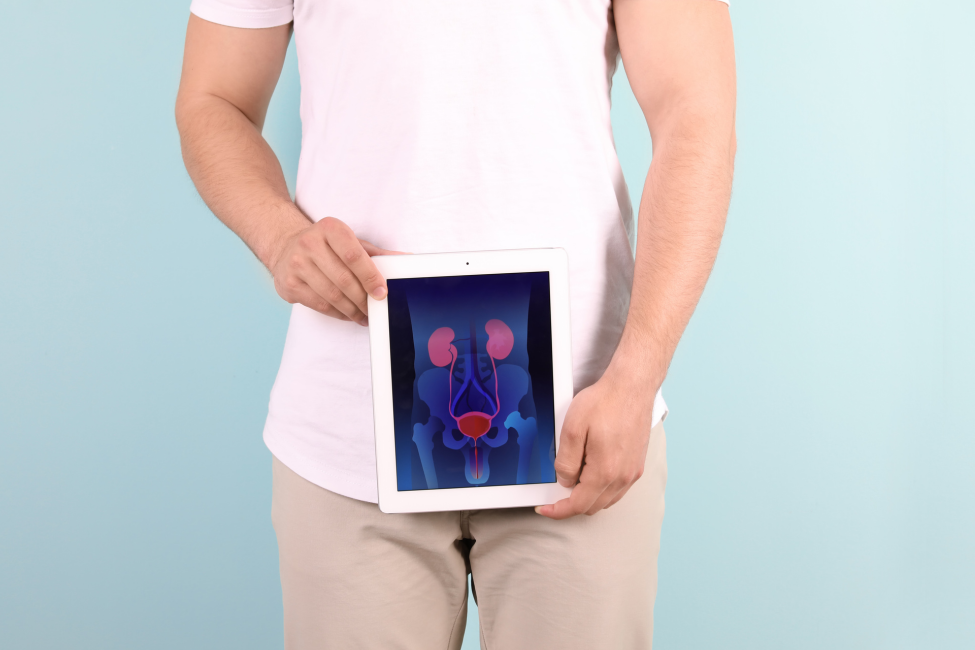
Let’s Talk Prostate Health
No man really wants to talk about their prostate, let alone natural solutions for prostate health. Do they sit around the coffee shop talking about it? NO?
Well, they should! Prostate health shouldn’t be brushed aside.
Despite its modest size, the prostate gland has a big job. Well … it really only has a few jobs, which we will highlight below, but the problems come when the prostate is acting up. While the risk of issues does tend to rise as you hit middle age, all men are susceptible to prostate problems, regardless of their stage in life.
Taking proactive steps to understand healthy prostate function and how best to care for your health early on can make a difference. By staying informed, not ignoring any prostate symptoms, and adopting healthy lifestyle habits, you can reduce the risk of encountering complications down the road.
In this blog, we will cover the potential health issues and provide you with the top 7 health solutions for prostate health.
The Prostate’s Role
This walnut-sized gland produces seminal fluid, a component of semen that aids the movement of sperm from the penis. In simpler terms, it creates part of the fluids expelled during ejaculation. Additionally, the prostate acts as a gatekeeper for the urethra, the tube responsible for carrying both urine and semen out of the body, particularly during ejaculation.
It also contains an enzyme called 5-alpha-reductase, which converts testosterone into dihydrotestosterone (DHT). This hormone regulates prostate function and contributes to the development of secondary sexual characteristics, such as facial hair growth.
If you want to read more about testosterone, check out our blog: Testosterone Hormone Facts for Both Sexes.

Understanding Prostate Health Challenges
When prostate health deteriorates, it can manifest in various ways that affect urinary and sexual functions. The prostate may become enlarged or inflamed, and its proximity to the urinary tract means its health is closely intertwined with urinary function. The prostate is a part of the Urogenital System. From a bioenergetic perspective, if you see a stressed Endocrine System or Urogenital dial on your scan, there are a few significant links.
In Traditional Chinese Medicine (TCM), the prostate is recognized as part of the kidney meridian. This also ties the prostate to the Urinary Bladder, which is the paired organ of the kidney. The bladder has a role because it is affected if the prostate enlarges.
Heavy metals are also implicated in prostate health. This post will share four heavy metals that may show up on bioresonance testing that may be linked to prostate cancer.
Common prostate symptoms include difficulties with bladder control, urgency in urination, a weakened urine stream, and challenges in initiating or halting urination. These symptoms can significantly impact daily life and may indicate underlying prostate issues. Left untreated, prostate problems can lead to various complications, including urinary tract infections, bladder stones, kidney failure, and these 3 well-known conditions:
Benign prostatic hyperplasia (BPH)
BPH, or enlarged prostate, is prevalent among men aged 50 and above. While the exact cause of BPH is not fully understood, it is believed to be linked to hormonal changes that occur with age. As the prostate becomes enlarged, it can press on the urethra, making it harder to empty your bladder and possibly prevent it entirely if it gets bad enough. By age 85, nearly 9 out of 10 men will experience (BPH).
Prostatitis
Prostatitis, characterized by inflammation and swelling of the prostate, is most common in men under 50. It can be caused by bacteria or fungal infections like candida, leading to acute prostatitis. If the inflammation persists beyond three months, it transitions into chronic prostatitis. This affects an estimated 10-15% of men in the US.
Prostate Cancer
This is the most common form of cancer in men. While the exact cause of prostate cancer is unknown, certain risk factors have been identified, including age, family history, ethnicity (African American men have a higher risk), and lifestyle factors such as diet and smoking. Chronic inflammation of the prostate, as seen in cases of prostatitis, may also play a role in increasing the risk of prostate cancer. Studies suggest that 1 in 8 men receive a prostate cancer diagnosis in their lifetime. While diagnoses typically occur around 65, the slow progression of the cancer means that mortality rates are lower.
Only 1 in 35 men will pass away from this disease. However, some forms of prostate cancer are more aggressive and deadly, so it’s important to get regular screenings as recommended by your doctor to detect it early on. Early-stage cancer may present without noticeable prostate symptoms.
Additional Risk Factors
Beyond age, ethnicity, diet, and smoking, environmental exposures may also contribute to prostate health complications. Emerging evidence suggests that exposure to certain chemicals, prevalent in both occupational settings and food sources, could heighten the risk of prostate cancer.
For instance, substances like cadmium, commonly found in manufacturing and industrial sectors, have been linked to an increased risk.
Others include:
- Arsenic
- Manganese
- Zinc
- Antimony
Regular blood screening is used for early detection and management of prostate conditions. PSA, or prostate-specific antigen, is a protein produced by both cancerous and noncancerous prostate tissue. PSA levels are commonly used for prostate cancer screening and treatment monitoring. Treatment options, including medications or surgery, depend on symptom severity and disease progression.
For BPH, alpha-blockers and 5-alpha reductase inhibitors are two different types of drugs that may be prescribed. Alpha-blockers work by relaxing the muscles in the urethra and neck of the bladder, improving urine flow. On the other hand, 5-alpha reductase inhibitors function by inhibiting the enzyme that converts testosterone into dihydrotestosterone (DHT). DHT is implicated in prostate cell proliferation and the enlargement of the prostate gland. By blocking the production of DHT, these inhibitors can slow or halt the growth of the prostate.
Exploring natural remedies for prostate symptoms is also a choice some men consider.
7 Natural Solutions for Prostate Health
Please remember that CBH Energetics does not diagnose or treat specific diseases or conditions; instead, we identify energetic patterns that may indicate imbalances or stressors in the body. By addressing these underlying imbalances, individuals can support their overall well-being and enhance their body’s natural healing processes.
- Saw Palmetto is a popular herbal remedy derived from the fruit of the Serenoa repens plant and is used to alleviate symptoms associated with BPH. Rich in fatty acids and phytosterols, Saw Palmetto may inhibit the conversion of testosterone to DHT. Research highlights that Saw Palmetto extract may improve urinary flow rate and reduce nighttime urination. Saw Palmetto may be taken in tinctures or as an herbal supplement.
- Stinging Nettle from the Urtica dioica plant is believed to alleviate prostate symptoms by exerting anti-inflammatory and diuretic effects. Like saw palmetto, it may effectively reduce urinary frequency and urgency. It is often incorporated into natural regimens alongside other remedies, such as pygeum or saw palmetto, synergistically enhancing their therapeutic effects.
- Minerals like Zinc and Selenium may be helpful for prostate health. A chronic zinc deficiency may increase the likelihood of BPH and prostate cancer in individuals aged over 50 years. Zinc is also involved in regulating the production of dihydrotestosterone. To mitigate the risk of zinc deficiency, consider taking zinc supplements or increasing your dietary intake of zinc-rich foods. Poultry, seafood, and several seeds and nuts, such as sesame and pumpkin seeds, are excellent sources of zinc. Selenium is a key component of selenoproteins, which play a role in antioxidant defense mechanisms and immune function. Studies suggest that adequate selenium levels may help reduce the risk of prostate cancer. Selenium-rich foods include Brazil nuts, seafood, poultry, and whole grains. Incorporating these foods into your diet can help maintain optimal selenium levels.
- Lycopene is a powerful antioxidant compound found abundantly in tomatoes and other red fruits and vegetables. Research shows that men with higher levels of lycopene in their diets tend to have a lower risk of developing prostate cancer. To incorporate lycopene into your diet, try tomatoes, watermelon, pink grapefruit, and papaya. Alternatively, supplements are available to boost your intake.
- Green tea is rich in antioxidants called catechins and has been studied for its anti-inflammatory and anticancer properties, which may help reduce the risk of developing prostate cancer. Incorporating green tea into your daily routine can be as simple as enjoying a hot cup of brewed tea or adding EGCG – green tea supplements to your diet.
- Omega-3 fatty acids in fatty fish such as salmon, mackerel, sardines, flaxseeds, chia seeds, and walnuts are essential nutrients potentially beneficial for prostate health. These healthy fats have anti-inflammatory properties and lower the risk of developing prostate cancer. Additionally, omega-3 fatty acids support overall cardiovascular health, which is important for maintaining prostate function. Include omega-3-rich foods in your diet or omega-3 supplements.
- Cranberries are rich in antioxidants and compounds called proanthocyanidins. They possess anti-inflammatory and antibacterial properties that may help prevent urinary tract infections and reduce inflammation in the prostate gland. Incorporating cranberry juice, fresh cranberries, or cranberry supplements into your diet can be a simple way to support urinary and prostate health.

In addition to incorporating these natural solutions into your routine, maintaining a healthy lifestyle can further support prostate health.
Avoid smoking, limit alcohol consumption, and exercise regularly.
Incorporate stress-reduction techniques like mindfulness meditation or yoga, as stress can exacerbate prostate symptoms. Drink plenty of water to stay hydrated, and aim for a balanced diet rich in fruits, vegetables, whole grains, and protein.
Lastly, consider getting a scan from CBH Energetics to assess your body’s energetic balance. A Full Scan can provide valuable insights into potential imbalances impacting prostate health.
